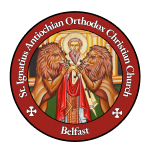On Tuesday evening, by anticipation, the Church celebrated the Bridegroom Orthros of Holy Wednesday. In the Gospel read during this service (John 12:17–50), we hear the Lord saying: “Believe in the light while you have the light, so that you may become children of light.” And afterwards it is said: “When he had finished speaking, Jesus left and hid himself from them” (John 12:26).
This moment marks the end of Christ’s public ministry. He had taught, performed signs, and revealed His Divine identity, including raising of Lazarus, which profoundly manifested His power over death. Christ had done all that was needed to lead people to faith in Him as the Son of God, the Light of the world.
The phrase “He departed and hid Himself from them” signifies not merely a physical withdrawal, but it is also a spiritual sign. The Light was still present, but those who rejected it were no longer able to see. From that point forward, the Lord turned His attention inward, spending His final days with His closest disciples, preparing them for His Passion and the mystery of salvation.
Are we among those disciples? Are we part of the inner circle? Do we truly believe in Him, not only as a wise teacher, but as our Lord and our God, the One who gives mercy and eternal life? If so, then love compels us to keep His commandments and to follow Him.
But when we fail (and we all do) there is still hope, through repentance. A striking example of repentance is set before us in the figure of the sinful woman who anointed the Lord’s feet with myrrh and her tears, drying them with her hair. This Gospel account (Matthew 26:6-16) is read during the Liturgy of the Presanctified Gifts on Holy Wednesday morning, and her story permeates the hymns of the Bridegroom Orthros as well.
This theme culminates in the Doxastikon of the Aposticha, known as the Hymn of Kassiani, written by the 9th-century nun and hymnographer Saint Kassiani. Sung in the special melodic formula of the 8th tone, in the traditional Byzantine style, this hymn is not only a beautiful piece of liturgical music but also a deeply moving and instructive meditation for our spiritual life. It places words of contrition and hope into the mouth of the penitent woman, allowing us to join in her repentance:

O Lord, the woman who had fallen into many sins perceived Thy divinity, and taking upon herself the duty of a myrrh-bearer, with lamentation she bringeth Thee myrrh-oils before Thine entombment. Woe unto me! saith she, for night is become for me a frenzy of licentiousness, a dark and moonless love of sin. Receive the fountains of my tears, O Thou Who dost gather into clouds the water of the sea. Incline unto me, unto the sighings of my heart, O Thou Who didst bow the Heavens by Thine ineffable condescension. I will kiss Thine immaculate feet, and wipe them again with the tresses of my head; those feet, at whose sound Eve hid herself for fear when she heard Thee walking in Paradise in the cool of the day. As for the multitude of my sins and the abyss of Thy judgments, who can search them out, O Savior of souls, my Savior? Do not disdain me, Thy handmaiden, O Thou Who art boundless in mercy.
Arabic: https://www.youtube.com/watch?v=HL7HGszMeM8
English: https://www.youtube.com/watch?v=kc49a8In1jg
This hymn is not only about the woman. It is about each one of us. Whenever we fall, whenever we weep for our sins, whenever we long to draw near to Christ again. And Christ, full of compassion, receives all who come to Him with repentance and faith.
